
The Timeless Charm of Mangal Bazaar, Patan
Mangal Bazaar, located in the heart of Patan, Nepal, is a mesmerizing blend of ancient history and vibrant culture. This bustling market square is surrounded by stunning Newari architecture, intricately carved wooden windows, and historic temples that date back centuries. As you wander through the narrow alleys, you'll be transported back in time, experiencing the daily lives of locals who have preserved their rich heritage for generations. One of the main attractions of Mangal Bazaar is the Patan Durbar Square, a UNESCO World Heritage Site that showcases the grandeur of Newar art and architecture. Here, you can explore the ancient royal palace, awe-inspiring temples, and beautiful courtyards. Don't miss the opportunity to visit the Hiranya Varna Mahavihar, also known as the Golden Temple, where you can witness the exquisite craftsmanship and spiritual ambiance. The market itself is a treasure trove of traditional handicrafts, from handwoven textiles to intricate metalwork. This is the perfect place to shop for unique souvenirs that capture the essence of Nepali culture. Be sure to try some local delicacies at the food stalls, where you can savor the flavors of traditional Newari cuisine. Whether you're a history buff, a culture enthusiast, or simply looking to experience the authentic charm of Nepal, Mangal Bazaar in Patan has something to offer for everyone.
Local tips in Mangal Bazaar
- Visit early in the morning to avoid crowds and enjoy a serene atmosphere.
- Hire a local guide to gain deeper insights into the history and significance of the sites.
- Carry cash, as most small shops and stalls do not accept credit cards.
- Wear comfortable shoes, as you'll be walking on uneven cobblestone streets.
- Respect local customs and traditions, especially when visiting temples.
The Timeless Charm of Mangal Bazaar, Patan
Mangal Bazaar, located in the heart of Patan, Nepal, is a mesmerizing blend of ancient history and vibrant culture. This bustling market square is surrounded by stunning Newari architecture, intricately carved wooden windows, and historic temples that date back centuries. As you wander through the narrow alleys, you'll be transported back in time, experiencing the daily lives of locals who have preserved their rich heritage for generations. One of the main attractions of Mangal Bazaar is the Patan Durbar Square, a UNESCO World Heritage Site that showcases the grandeur of Newar art and architecture. Here, you can explore the ancient royal palace, awe-inspiring temples, and beautiful courtyards. Don't miss the opportunity to visit the Hiranya Varna Mahavihar, also known as the Golden Temple, where you can witness the exquisite craftsmanship and spiritual ambiance. The market itself is a treasure trove of traditional handicrafts, from handwoven textiles to intricate metalwork. This is the perfect place to shop for unique souvenirs that capture the essence of Nepali culture. Be sure to try some local delicacies at the food stalls, where you can savor the flavors of traditional Newari cuisine. Whether you're a history buff, a culture enthusiast, or simply looking to experience the authentic charm of Nepal, Mangal Bazaar in Patan has something to offer for everyone.
Iconic landmarks you can’t miss
Patan Darbar Square
Discover the rich history and stunning architecture of Patan Darbar Square, a UNESCO World Heritage Site in Lalitpur, Nepal.
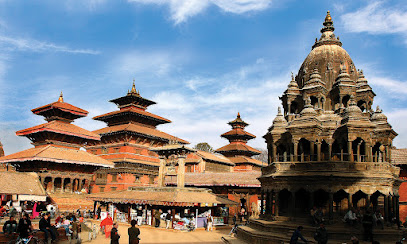
Krishna Mandir
Explore the enchanting Krishna Mandir in Lalitpur, an architectural marvel and sacred Hindu temple steeped in rich cultural heritage.
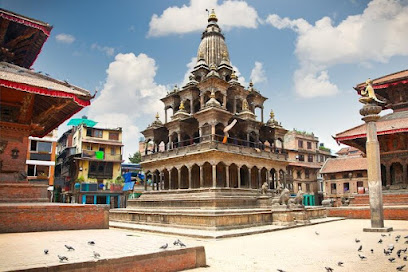
Patan Museum
Explore the exquisite artistry and historical significance at Patan Museum, a UNESCO World Heritage Site in Lalitpur, Nepal, where culture comes alive.
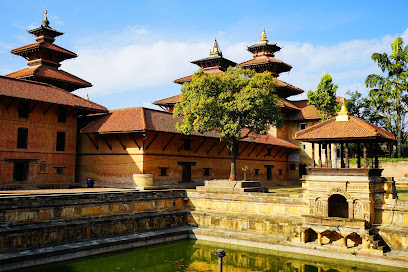
Mangal Bazar
Discover the cultural heartbeat of Lalitpur at Mangal Bazar, where vibrant markets, local cuisine, and rich traditions come alive.
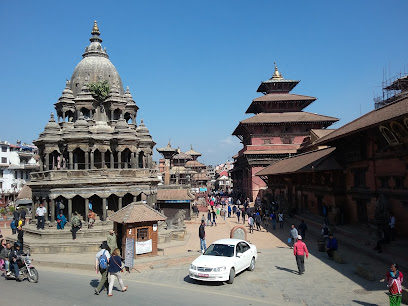
Bhimsen Mandir
Explore the architectural beauty and spiritual essence of Bhimsen Mandir, a cultural gem in Lalitpur, Nepal, perfect for travelers seeking tranquility.
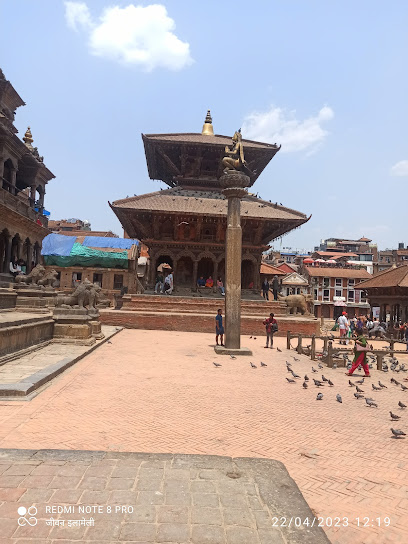
Mul Chowk
Explore the architectural marvels of Mul Chowk, a historical landmark in Lalitpur, where culture and artistry intertwine in a vibrant atmosphere.
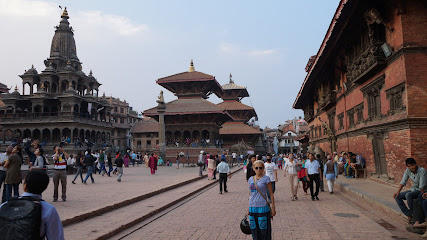
Tusha Hiti
Discover the tranquility of Tusha Hiti, a historical water reservoir in Patan, showcasing exquisite Newari architecture and a serene atmosphere.
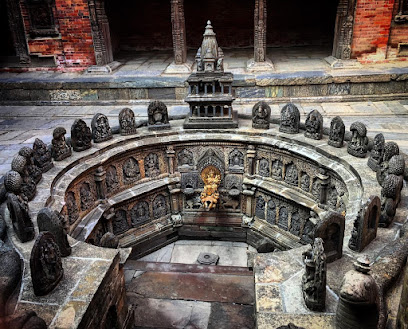
Purnachandi Pond
Explore the serene Purnachandi Pond in Lalitpur, a historical landmark surrounded by lush greenery and rich local culture.
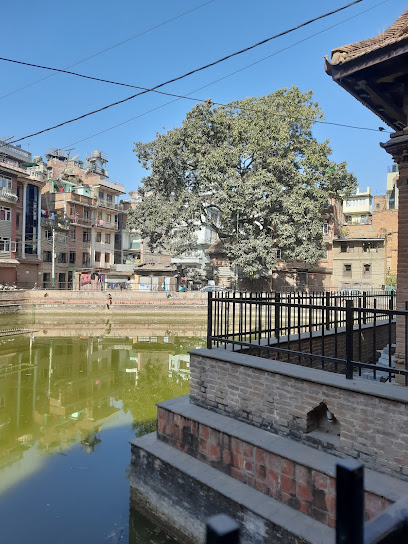
Taleju Bell
Explore the Taleju Bell in Lalitpur, a historical landmark that resonates with the rich cultural heritage of Nepal.
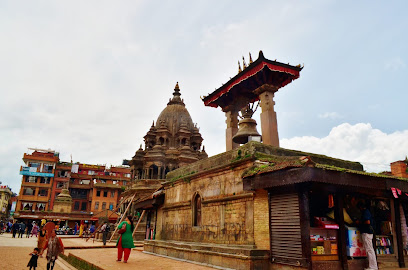
Patan Durbar Square
Discover the intricate beauty and rich history of Patan Durbar Square, a UNESCO World Heritage Site in Lalitpur, Nepal, filled with stunning architecture and vibrant culture.
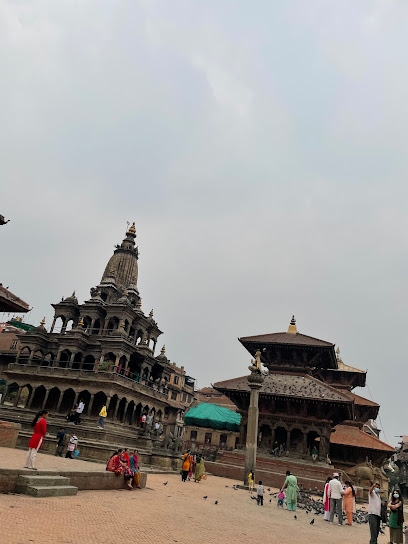
Saugal
Explore Saugal, a historical landmark in Lalitpur, where rich heritage meets vibrant local culture, offering an authentic glimpse into Nepal's past.
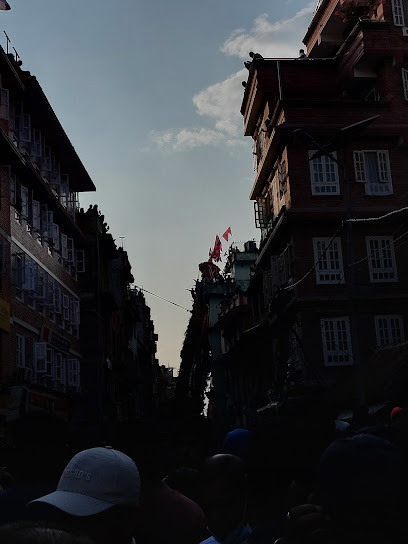
King Yognarendra Malla’s statue, योगनरेन्द्र मल्ल स्तंभ
Explore the historical significance of King Yognarendra Malla’s statue in Lalitpur, a cultural landmark reflecting Nepal's rich heritage and artistry.
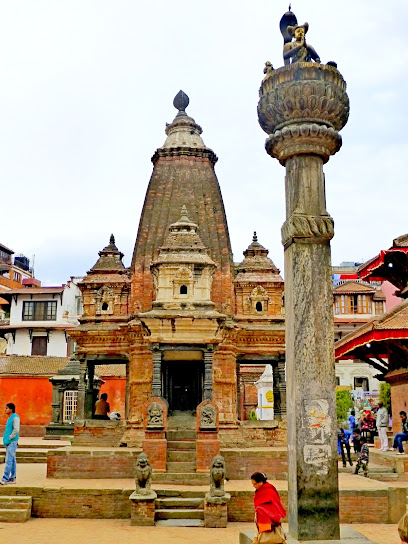
लुँखुसि मंका भजन फले
Experience the rich heritage and vibrant culture at Lunkhusi Manka Bhajan Phela, a historical landmark in Lalitpur, Nepal.
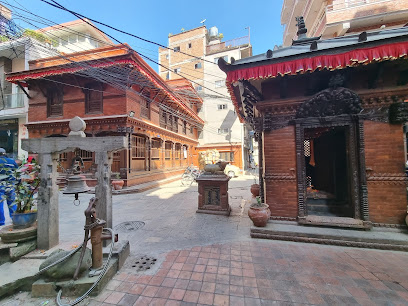
Unmissable attractions to see
UN Park
Explore UN Park in Lalitpur, a tranquil haven offering lush landscapes and a glimpse into local culture, perfect for relaxation and family outings.
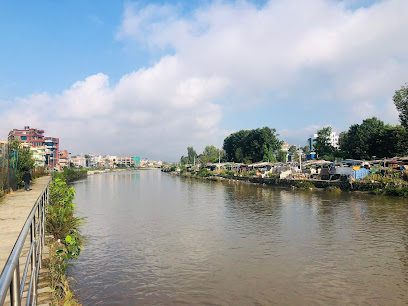
Hiranya Varna Mahavihar
Experience the serene beauty and spiritual richness of Hiranya Varna Mahavihar, a remarkable Buddhist temple in Lalitpur, Nepal.
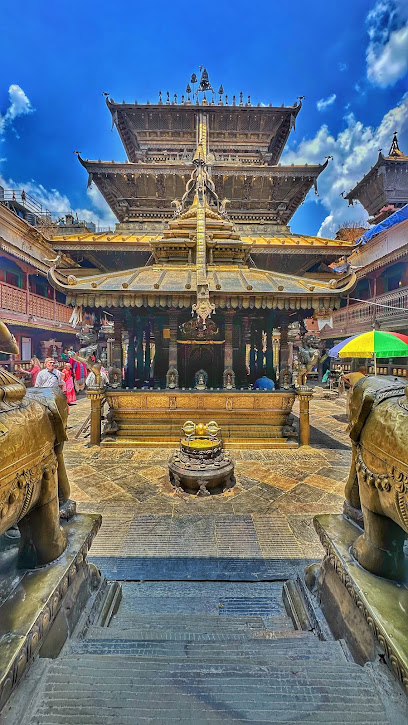
Oku Bahal Rudra Varna Mahavihar
Experience the tranquility and rich heritage of Oku Bahal Rudra Varna Mahavihar, a stunning Buddhist temple and historical site in Lalitpur, Nepal.
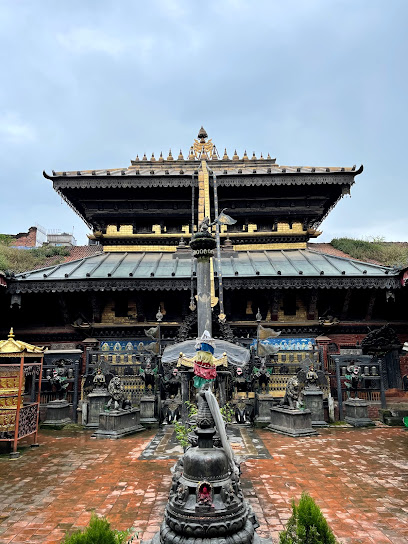
Bhimsen Mandir
Discover the architectural beauty and spiritual significance of Bhimsen Mandir, a captivating Hindu temple in Lalitpur, Nepal, rich in culture and heritage.
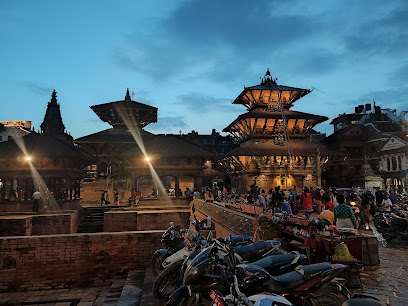
Taleju Bell
Explore the Taleju Bell, a historical gem in Lalitpur that showcases Nepal's rich culture and exquisite craftsmanship.
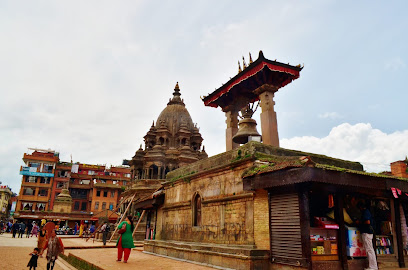
Gautam House
Explore the serene beauty and rich culture of Gautam House in Lalitpur, a must-see tourist attraction for every traveler.
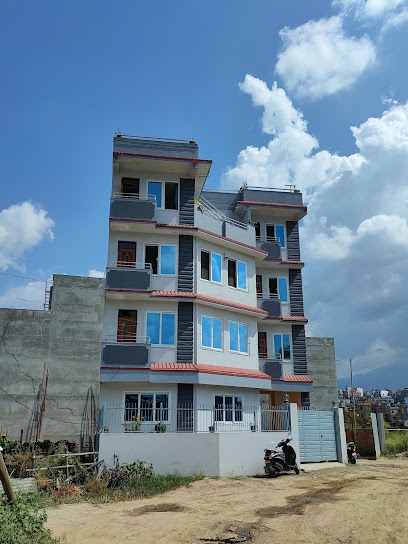
Essential places to dine
Dhokaima Cafe
Discover the perfect blend of traditional Nepali cuisine and modern cafe culture at Dhokaima Cafe in Lalitpur.
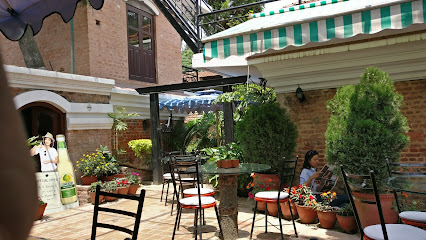
Cafe De Patan
Discover authentic Newari and Nepali flavors at Café De Patan in Lalitpur - where culinary traditions meet warm hospitality.
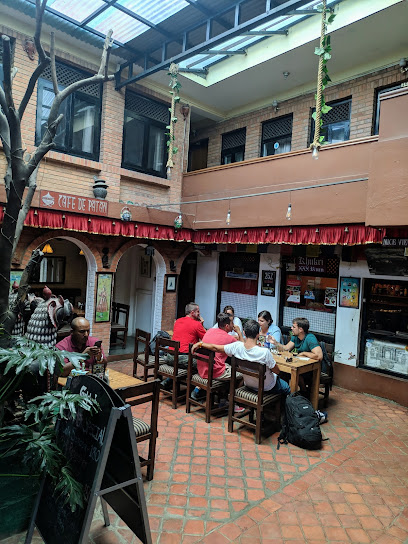
Drishya Restaurant
Discover authentic flavors at Drishya Restaurant in Lalitpur - where culinary tradition meets modern dining.
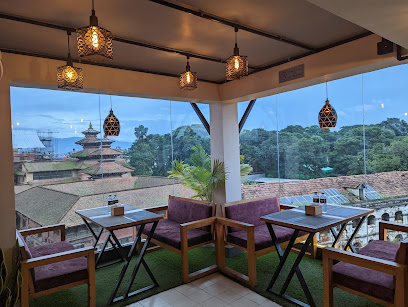
Yala Garden Cafe & Restro
Experience delightful dining amidst nature at Yala Garden Cafe & Restro in Lalitpur, where local flavors meet serene surroundings.
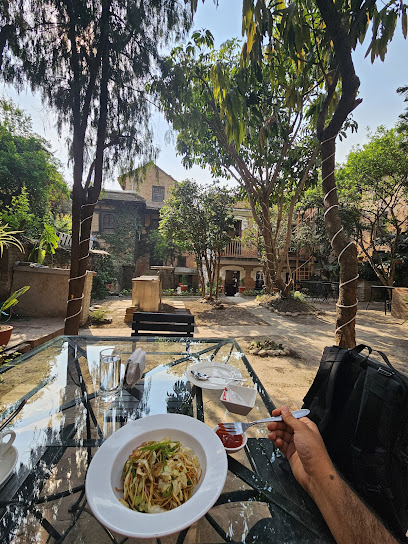
Patko Kitchen
Experience authentic Nepalese cuisine at Patko Kitchen in Lalitpur - where every dish tells a story of tradition and flavor.
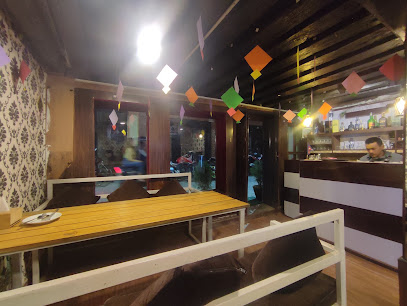
Patan Heritage Home & Restaurant
Experience authentic Nepalese cuisine in a beautifully restored heritage home in Lalitpur.
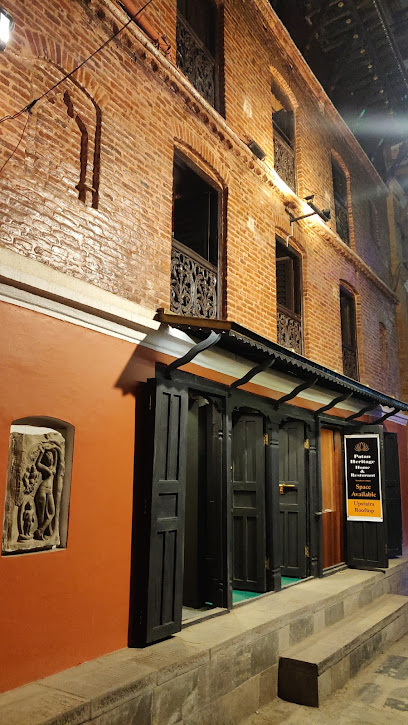
FLAMES CAFE & RESTAURANT
Discover Flames Cafe & Restaurant in Lalitpur: A delightful blend of local flavors and international cuisine awaits you.
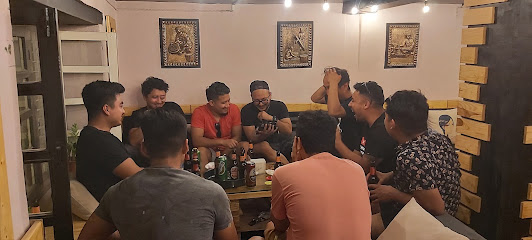
Mangale Restro
Experience authentic Nepalese cuisine blended with international flavors at Mangale Restro in Lalitpur.
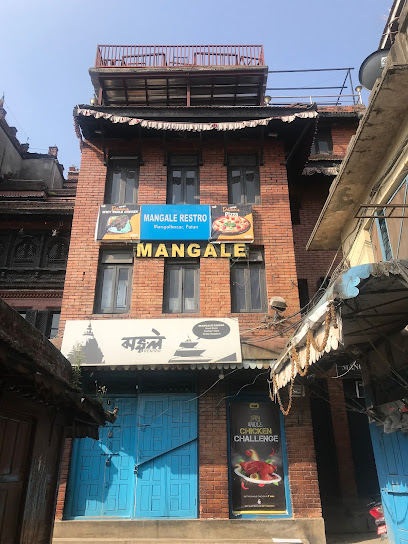
Foodhub by H20 (Patan)
Experience authentic Nepalese cuisine at Foodhub by H20 in Patan - a culinary gem offering delightful dishes in a warm atmosphere.
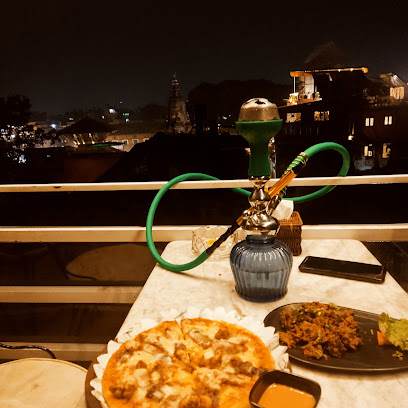
Little Patan Restaurant & Cafe
Experience authentic Nepalese cuisine at Little Patan Restaurant & Cafe in Lalitpur - a culinary gem rich in flavor and culture.

Markets, malls and hidden boutiques
Labim Mall
Discover Labim Mall in Lalitpur, Nepal – a vibrant shopping destination featuring local and international brands, dining, and entertainment for all.
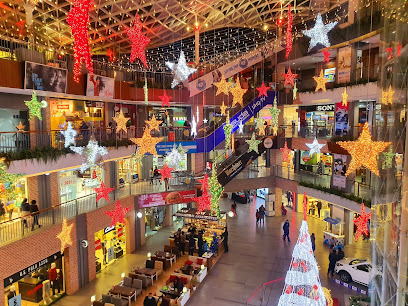
Mahaguthi Craft with Conscience
Discover exquisite Nepali handicrafts at Mahaguthi Craft with Conscience, where each purchase supports local artisans and sustainability.
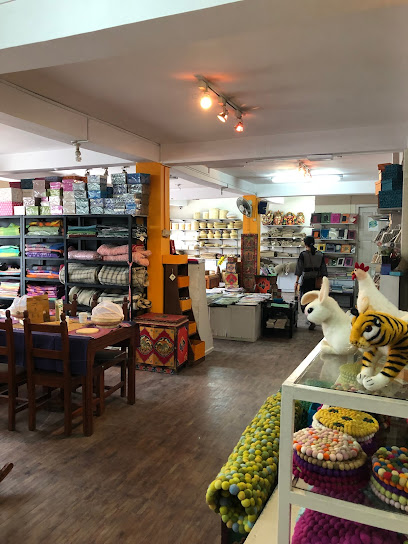
Mugiwara Store (anime shop)
Explore Mugiwara Store, Lalitpur's top destination for anime merchandise, clothing, and collectibles in a vibrant atmosphere.
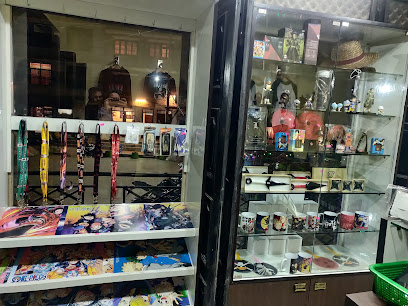
Handicraft Creation
Experience the vibrant artistry of Nepal at Handicraft Creation, where local artisans showcase exquisite handcrafted treasures.
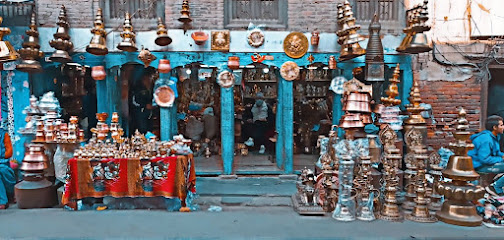
Om Handicrafts
Explore the vibrant craftsmanship of Nepal at Om Handicrafts, a unique shopping mall and handicraft museum in Lalitpur.
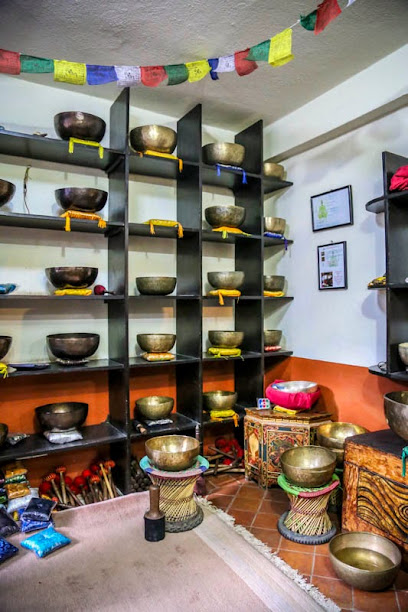
Patan Museum Gift Shop
Explore the enchanting Patan Museum Gift Shop for authentic Nepali handicrafts and unique souvenirs that celebrate Nepal's rich cultural heritage.
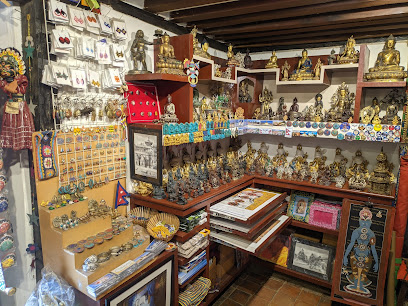
Nepal Collection
Uncover the essence of Nepal with exquisite handicrafts and unique souvenirs at Nepal Collection in Lalitpur.
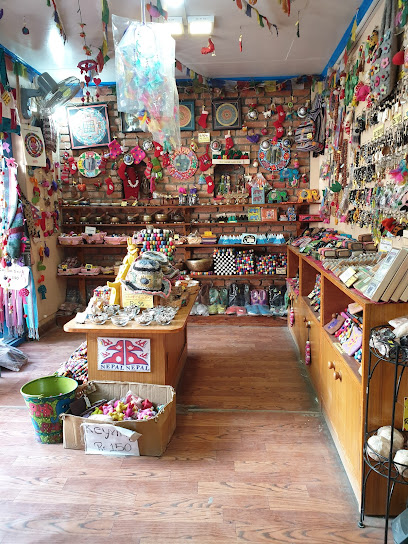
Hamro Kosis
Explore Hamro Kosis in Lalitpur for unique and handcrafted clothing that embodies the essence of Nepalese culture and style.
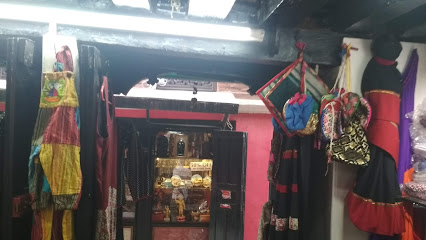
MAHAPAL GIFT SHOP
Explore Mahapal Gift Shop for authentic Nepali crafts and unique souvenirs in the heart of Lalitpur, a must-visit for every traveler.

Gautam Gift Emporium
Explore Gautam Gift Emporium: A unique blend of shopping and cultural immersion in the heart of Lalitpur, Nepal.
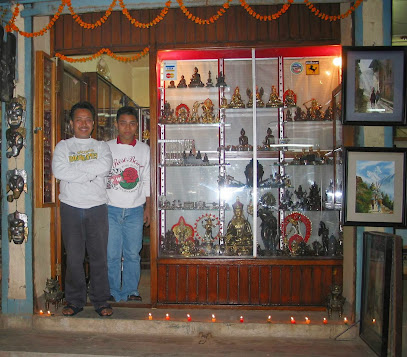
Essential bars & hidden hideouts
Vibes Restro And Lounge
Discover the lively ambiance of Vibes Restro And Lounge in Lalitpur, a perfect blend of relaxation, great food, and live music for all tourists.
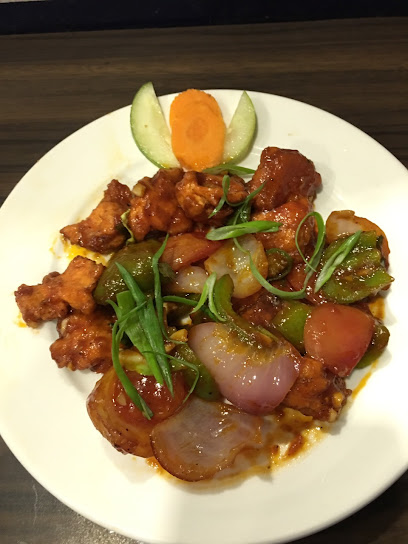
.
Experience the charm of Lalitpur at this delightful bar, offering a variety of drinks in a cozy, cultural setting.
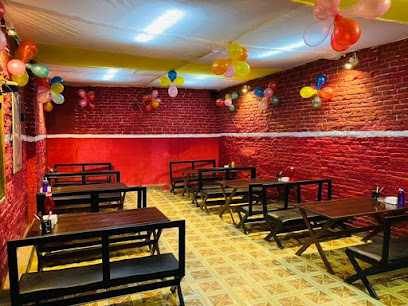
Fizzy Liquor Store
Experience the vibrant nightlife at Fizzy Liquor Store in Lalitpur, where unique drinks and local culture blend for an unforgettable evening.
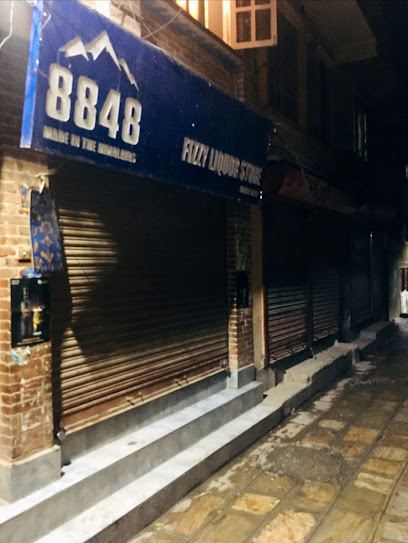
PetPooja Restro & Bar
Experience the flavors of Nepal at PetPooja Restro & Bar, a lively dining spot in Lalitpur with a diverse menu and inviting atmosphere.
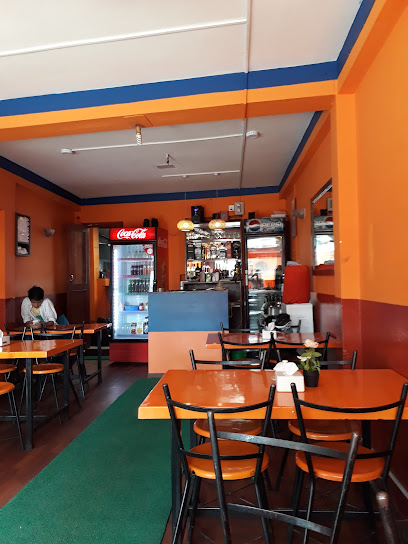
Aama ko bhathi
Discover the vibrant atmosphere of Aama ko bhathi, a local bar in Lalitpur where culture and hospitality blend beautifully.

Nepali Ghar Restaurant & Bar
Discover the vibrant flavors of Nepal at Nepali Ghar Restaurant & Bar, where traditional cuisine meets a lively atmosphere in Lalitpur.
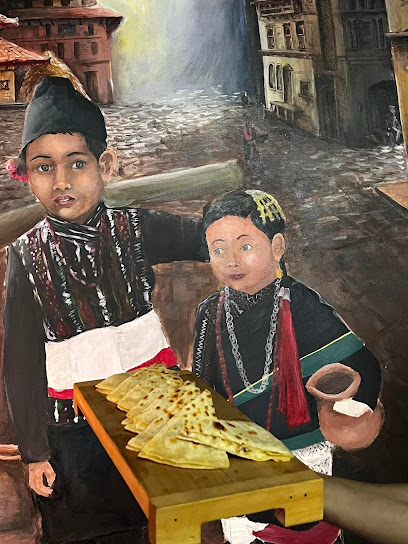
Solukhumbu khotang Khaja hub-Lalitpur
Experience the vibrant culture of Lalitpur at the Solukhumbu Khotang Khaja Hub, where local flavors and lively ambiance meet.
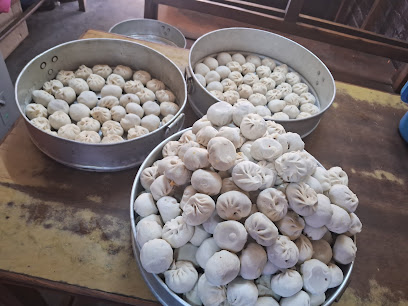
Dori Bar
Experience the vibrant nightlife of Lalitpur at Dori Bar, where eclectic decor meets a lively atmosphere and refreshing drinks await.
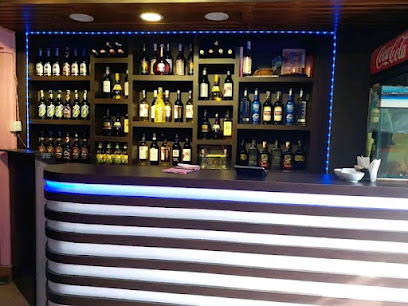
Vinita's Lounge And Bar
Experience the vibrant nightlife at Vinita's Lounge And Bar, where the drinks flow as freely as the laughter amidst Lalitpur's cultural charm.

Namaste Liquor Shop
Discover the charm of Namaste Liquor Shop in Lalitpur, where local spirits meet vibrant conversations in a cozy bar setting.

Local Phrases
-
- Helloनमस्ते
[namaste] - Goodbyeछिको
[chhiko] - Yesहो
[ho] - Noहोइन
[hoin] - Please/You're welcomeकृपया
[krupaya] - Thank youधन्यवाद
[dhanyabad] - Excuse me/Sorryमाफ गर्नुहोस्
[maaf garnuhos] - How are you?तपाईंलाई कस्तो छ?
[tapailai kasto chha?] - Fine. And you?राम्रो छ। तपाईंलाई?
[ramro chha? tapailai?] - Do you speak English?तिमी अंग्रेजी बोल्छौ?
[timi angreji bolchhau?] - I don't understandमैले सम्झिन
[maile samjhin]
- Helloनमस्ते
-
- I'd like to see the menu, pleaseकृपया मेनु हेर्न चाहन्छु
[krupaya menu hern chahanchu] - I don't eat meatम मासु खाँदिन
[ma masu khandin] - Cheers!चियर्स!
[chears!] - I would like to pay, pleaseकृपया भुक्तानी गर्न चाहन्छु
[krupaya bhuktani garn chahanchu]
- I'd like to see the menu, pleaseकृपया मेनु हेर्न चाहन्छु
-
- Help!मदत गर्नुहोस्!
[madat garnuhos!] - Go away!अब जानुहोस्!
[ab januhos!] - Call the Police!पुलिसलाई बोलाउनुहोस्!
[poliselai bolaunuhos!] - Call a doctor!डाक्टरलाई बोलाउनुहोस्!
[daktar lai bolaunuhos!] - I'm lostम हराएको छु
[ma haraeko chu] - I'm illम अश्वस्थ छु
[ma ashwasth chu]
- Help!मदत गर्नुहोस्!
-
- I'd like to buy...म किन्न चाहन्छु...
[ma kinn chahanchu...] - I'm just lookingम सानै हेरिरहेको छु
[ma sanai heriraheko chu] - How much is it?यो कति हो?
[yo kati ho?] - That's too expensiveयो धेरै महँगो छ
[yo dherai mahango cha] - Can you lower the price?के तपाईं मुल्य हाल्न सक्नु हुन्छ?
[ke tapai mulya haln saknu hunchha?]
- I'd like to buy...म किन्न चाहन्छु...
-
- What time is it?कति बजेको छ?
[kati bajeko cha?] - It's one o'clockएक बजे भएको छ
[ek baje bhaeko cha] - Half past (10)दस बजे देखि आधा
[das baje dekhi aadha] - Morningबिहान
[bihan] - Afternoonबेलुका
[beluka] - Eveningसाँझ
[sah] - Yesterdayहिजो
[hijo] - Todayआज
[aaj] - Tomorrowभोलि
[bholi] - 1एक
[ek] - 2दुइ
[dui] - 3तीन
[tin] - 4चार
[chaar] - 5पाँच
[paanch] - 6छ
[chha] - 7सात
[saat] - 8आठ
[aath] - 9नौ
[nau] - 10दस
[das]
- What time is it?कति बजेको छ?
-
- Where's a/the...?कहाँ छ...?
[kaha cha...?] - What's the address?ठेगाना के हो?
[thegana ke ho?] - Can you show me (on the map)?के तपाईं मलाई देखाउन सक्नुहुन्छ (नक्सामा)?
[ke tapai malai dekhaun saknuhunchha (naksama)?] - When's the next (bus)?अर्को (बस) कहिले आउँछ?
[arko (bas) kahile aun chha?] - A ticket (to ....)एक टिकट (....मा)
[ek ticket (....ma)]
- Where's a/the...?कहाँ छ...?
History of Mangal Bazaar
-
Mangal Bazaar, located in the heart of Patan, has been a vibrant commercial hub since the medieval period. Its name translates to 'auspicious market', and it has served as the main marketplace for the city, facilitating trade and commerce among the local artisans and merchants. The bazaar is historically significant as it showcases the economic activities that have flourished in Patan over centuries, particularly during the Malla period when the city was a major center of trade.
-
Mangal Bazaar is home to several important temples and shrines, reflecting the rich cultural and religious heritage of the region. The Krishna Mandir, built in the 16th century, is a prime example of the intricate stone carvings characteristic of Patan's architecture. The bazaar has been a focal point for religious festivals and community gatherings, further embedding it in the cultural fabric of Patan.
-
The devastating earthquake of 1934 significantly impacted Mangal Bazaar and the surrounding areas. Many of the ancient structures were damaged or destroyed, leading to extensive reconstruction efforts. This event highlighted the resilience of the local community and their dedication to preserving their cultural heritage, as many temples and shops were rebuilt with care, maintaining their historical significance.
-
In recent years, Mangal Bazaar has witnessed a revival of traditional crafts, particularly metalwork and woodwork, which have been integral to Patan's identity. The bazaar attracts artisans who continue to use age-old techniques, contributing to the preservation of Patan's artistic heritage. This revival has not only supported local craftsmen but has also drawn tourists seeking authentic Nepali handicrafts.
-
Today, Mangal Bazaar remains a bustling center of commerce and culture, blending the historical with the contemporary. It serves as a crucial link between Patan's past and present, where locals and visitors alike can experience the vibrancy of traditional markets alongside modern shops and cafes. The bazaar continues to be a testament to Patan's enduring legacy as a cultural and economic center in Nepal.
Mangal Bazaar Essentials
-
Mangal Bazaar is located in the heart of Patan, and can be easily accessed from other neighborhoods within the city. If you're coming from the Patan Durbar Square area, it's just a 10-15 minute walk. Taxis and rickshaws are readily available and can be hired for a quick ride. For those coming from Kathmandu, local buses run frequently to the Lagankhel bus station, which is about a 15-minute walk to Mangal Bazaar.
-
Mangal Bazaar is best explored on foot, as many of its narrow streets and alleyways are pedestrian-friendly. Bicycles can be rented for a more leisurely exploration, but be cautious of traffic. Local taxis and rickshaws are available for longer distances or if you're carrying heavy items from the market. Public transport options like microbuses can be used to reach nearby neighborhoods.
-
Mangal Bazaar is generally safe for tourists, but it's wise to remain vigilant, especially in crowded areas. Petty crimes like pickpocketing can occur, particularly near busy stalls. It’s advisable to avoid poorly lit alleys at night and keep valuables secure. While there are no specific high-crime areas, it's best to stay alert and avoid showing large amounts of cash.
-
In case of emergency, dial 100 for police assistance, 101 for fire, and 102 for medical emergencies. There are several hospitals and clinics in the area, including the Patan Hospital. It is recommended to have travel insurance that covers medical emergencies. For minor health issues, local pharmacies can provide over-the-counter medications.
-
Fashion: Do dress modestly, especially in temples and religious sites. Avoid shorts and sleeveless tops. Religion: Do respect local customs; remove shoes when entering temples. Public Transport: Do give your seat to the elderly or pregnant women. Don't eat or drink on public transport. Greetings: Do greet locals with a smile and 'Namaste'. Don't use your left hand for giving or receiving items, as it is considered impolite. Eating & Drinking: Do try local street food but ensure it is freshly prepared. Don't drink tap water; instead, opt for bottled water.
-
To experience Mangal Bazaar like a local, visit early in the morning when vendors set up their stalls and the market is bustling with activity. Engage with local shopkeepers; many are friendly and eager to share stories about their crafts. Don't miss trying traditional Newari foods at local eateries, and consider visiting during festivals for a vibrant cultural experience.
Nearby Cities to Mangal Bazaar
-
Things To Do in Kathmandu
-
Things To Do in Bhaktapur
-
Things To Do in Nagarkot
-
Things To Do in Gorkha
-
Things To Do in Bandipur
-
Things To Do in Chitwan
-
Things To Do in Namche Bazaar
-
Things To Do in Pokhara
-
Things To Do in Patna
-
Things To Do in Lumbini
-
Things To Do in Darjeeling
-
Things To Do in Siliguri
-
Things To Do in Gangtok
-
Things To Do in Varanasi
-
Things To Do in Paro











